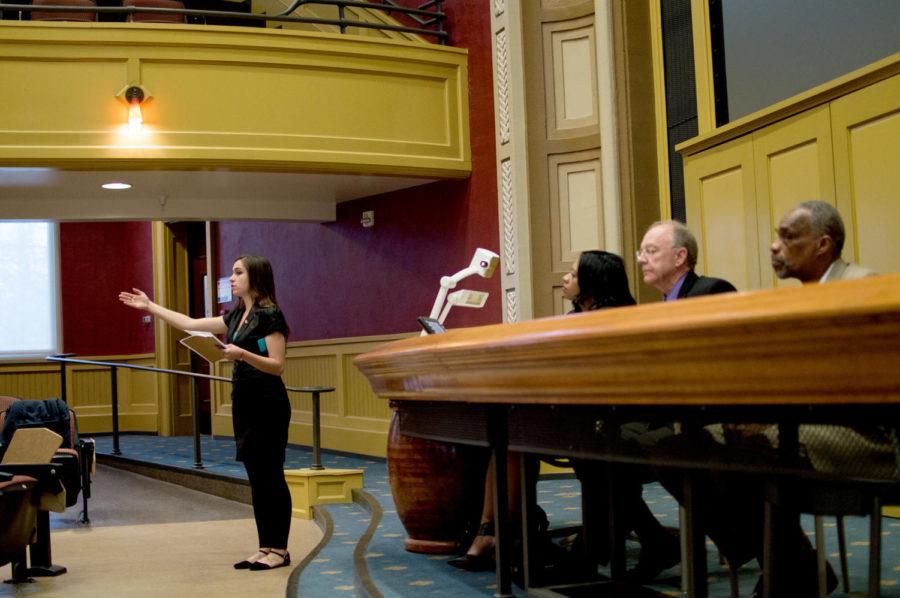Open forum held to discuss sexual assault
Charlie Coffey/Iowa State Daily
The moderator of the Office of Civil Rights public discussion introduces members of the panel for the discussion and asks the first question in Curtiss Hall on Tuesday.
April 22, 2015
Students and faculty gathered in room 127 of Curtiss Hall on Tuesday night to take part in an open forum regarding the investigation by the U.S. Department of Education Office for Civil Rights involving a sexual assault case on campus.
“Our role is to make it better,” said vice president Tom Hill. “If we only push it forward a little bit, it’s better than sitting here accepting the status quo and not doing anything.
Jerry Stewart, director of public safety; Robin Kelley, Title IX director; Dr. Pamela Anthony, vice president; and Hill took the stage to listen to suggestions and answer questions voiced by the students.
While the topic was sensitive, there were student mediators directing the conversation and enforcing the rule of respect among participants.
At multiple points, there were references to the wording of sexual assault policies. Many students voiced their concerns about the vagueness.
Some attendees were unclear of the consequences of the perpetrator if convicted by the Office of Judicial Affairs. The university clarified that expulsion and suspension were the most extensive options for punishment.
“We’re not perfect, but I think we do a pretty good job,” Hill said. “We have conscientious people who work top to bottom trying to get this thing done.”
“Consent” was a word thrown among the conversation frequently. Multiple students expressed a desire for a more clarified definition of the term in the university’s policies.
Hill expressed his sympathy and frustration when dealing with the sexual assault processes.
“I wish I could do more, simply,” Hill said. “I wish I had the ability to stop it. No one deserves to be violated like that, I don’t care who it is.”
Students also voiced their own personal experiences.
“We are talking about survivors in a third person, but this is a first person issue,” said Meredith Cook, junior in political science.
For the duration of the forum, many statistics addressing sexual assault were brought up. Some statistics claim up to 68 percent of sexual assaults go unreported, whether it is embarrassment, a feeling of helplessness or the victim not believing the perpetrator will be prosecuted.
Stewart reminded the audience that not all victims choose to report the crime or press charges.
“We like to have participation, but we understand that not everyone wants to participate,” Anthony said.
The administrators said they understand their duty to explain and examine their position.
“It comes as a responsibility and a privilege when serving in these roles,” Anthony said. “I am so impressed and pleased with the fact that the students took charge.”
The Sexual Misconduct Leadership Committee is taking steps to reach out to students. The committee meets monthly to discuss which prevention techniques are and are not working to benefit students.
“We know we are a large institution and there are some decentralization, and that’s not bad,” Anthony said. “How do we centralize our resources so that everyone knows what everyone is doing.”
This year, the committee published a poster for Sexual Assault Awareness month and organized events geared toward giving students tools and resources.
“We are a very diverse community,” Hill said. “To think one size fits all is a huge mistake.”

















